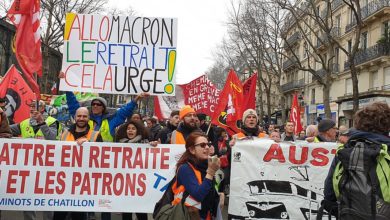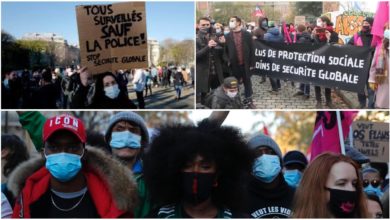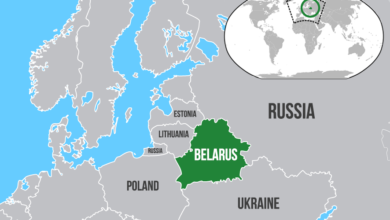The class struggle in France is raging. A wave of strikes, coupled with another spontaneous rebellion in the working-class suburbs of Paris show that deep inequalities exist in the capitalist welfare state.
The regime of Nikolas Sarkozy, France’s right-wing president, has been the primary instigator and target of these
|
A massive transportation strike swept the country for nine days in November.
The strikes began after Sarkozy maneuvered to push back the retirement age of 500,000 public sector workers. This “reform” would require 40 years of work instead of the current 37 1/2 years before workers get full pension benefits. This plan is part of a broader assault on the French working class.
During the strike, transit workers shut down 90 percent of the metro system, 676 of 700 high speed trains and paralyzed traffic in the largest transportation stoppage in 12 years. The government of France estimates that the work stoppages cost around $592 million per day.
Public service workers joined the struggle in solidarity. On Nov. 20 nurses, air traffic controllers, teachers and post office and government workers held a one-day strike to demand higher salaries. Millions of workers walked out that day; nearly 970,000 people across the country participated in marches.
But five days earlier, the vast majority of French transit workers voted to end the strike. They suspended the strike on Nov. 23 and returned to work three days later. About 10 percent of striking workers continued the action, despite the wishes of the unions behind the strike.
The transit unions suspended the strike without achieving their demands. They are still negotiating with the government and private operators. Sarkozy maintains that he will not alter the retirement-benefit age hike: “I have promised, and I have held to them.”
Thus far, the negotiations have yielded few results. One major union federation, the CGT (General Confederation of Labor), attempted to call a 24-hour strike on Dec. 11, but reversed its decision because another union federation, the SUD (Rail Federation of Trade Unions), refused to support it. The growing schisms within the French labor movement on tactical questions and the intransigence of the government and private operators is taking its toll.
Rank-and-file union members are demanding broader and more radical actions to forward their demands as the negotiations continue through December. The government is only offering slight “wage increases”; nothing more. Its pension demands are still the ultimate goal.
The struggle is not yet over. Other factors have weighed in as class lines continue to be drawn.
On Nov. 27, thousands of university and high school students hit the streets in Paris, Toulouse and Rennes against Sarkozy’s proposed university reform law. Students chanted, “We don’t want to be fodder for the bosses!” The reform would create a two-tier education system funded by big businesses. Between 43 and 46 of France’s 85 universities were blocked.
And just two days earlier, a spontaneous rebellion was ignited in the working-class French suburb of Villiers-le-Bel. This rebellion, like the uprising in 2005, occurred in reaction to racist profiling by French cops. Two youth of color died in motorbike accident after they were rammed by a police car and left without medical care. Four nights of rebellion ensued.
Sarkozy, who played a racist role as interior minister during the 2005 uprising, made equally reactionary statements on Nov. 29: “I reject any form of other-worldly naivety that wants to see a victim of society in anyone who breaks the law, a social problem in any riot,” he said in a speech to police officers.
“What happened in Villiers-le-Bel has nothing to do with a social crisis. It has everything to do with a ‘thugocracy’.”
Over 1,000 riot cops eventually pacified the neighborhood with repression. But the youth rebelling were armed and angrier this time. None of social roots that fueled the rebellion—unemployment and rampant racism to name a few—have been curbed or even acknowledged. This reality is evident in Sarkozy’s reactionary rhetoric and actions. With his “reforms” and take-backs in motion, Sarkozy intends to heighten them.
These seemingly disparate struggles are woven into the fabric of capitalism. The people of France are continuing to fight against aggressive anti-worker attacks on many fronts. The struggle is taking different forms in various sectors of society. As the capitalists intensify their assault, the need for coordinated class struggle becomes clearer.






